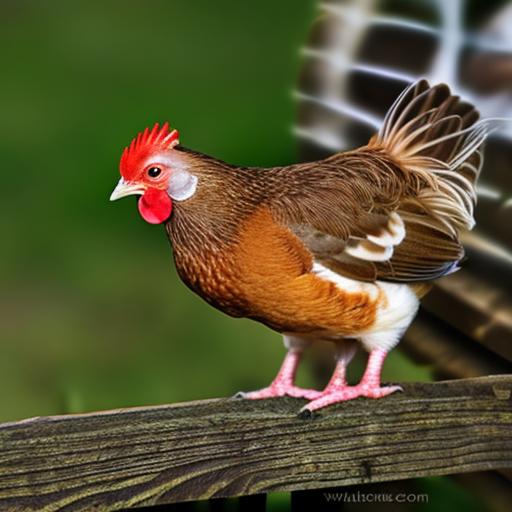Keeping chickens as a hobby has become increasingly popular in recent years. More and more people are discovering the joys of having their own flock of chickens in their backyard. Not only do chickens provide fresh eggs, but they also bring a sense of joy and entertainment with their unique personalities. Additionally, chicken manure can be used as a natural fertilizer for gardens and plants. In this article, we will explore the benefits of keeping chickens, the factors that affect the difficulty of chicken keeping, how to choose the right chicken breed, building a chicken coop, maintaining a clean coop, feeding and watering chickens, protecting them from predators, and ensuring their health and wellness.
Key Takeaways
- Keeping chickens has many benefits, including fresh eggs, natural pest control, and fertilizer for gardens.
- The difficulty of keeping chickens can be affected by factors such as climate, predators, and local regulations.
- Choosing the right chicken breed is important for factors such as egg production, temperament, and climate adaptability.
- Building a chicken coop requires consideration of factors such as size, ventilation, and predator-proofing.
- Maintaining a clean chicken coop, providing proper feeding and watering, and protecting chickens from predators are all important for the health and wellness of chickens.
Benefits of Keeping Chickens
One of the main benefits of keeping chickens is having a constant supply of fresh eggs. There is nothing quite like collecting eggs from your own backyard and knowing exactly where they came from. Fresh eggs have a richer taste and vibrant yolks compared to store-bought eggs. In addition to the taste, having fresh eggs readily available can also save you money in the long run.
Another benefit of keeping chickens is the joy they bring to your backyard. Chickens have unique personalities and watching them can be highly entertaining. They have their own social hierarchy and interact with each other in fascinating ways. Some chickens are curious and adventurous, while others are more shy and reserved. Observing their behaviors can be both educational and enjoyable.
Furthermore, chicken manure is an excellent source of fertilizer for gardens and plants. It is rich in nutrients that can help improve soil quality and promote healthy plant growth. By keeping chickens, you not only have access to fresh eggs but also a sustainable source of natural fertilizer.
Factors that Affect the Difficulty of Keeping Chickens
While keeping chickens can be a rewarding hobby, there are several factors that can affect the difficulty level. One important factor is climate and weather conditions. Chickens are sensitive to extreme temperatures, so it is important to provide them with a suitable environment. In hot climates, chickens need access to shade and plenty of fresh water to stay cool. In cold climates, they need a well-insulated coop and protection from drafts.
Another factor that can affect the difficulty of keeping chickens is the presence of predators in your area. Predators such as raccoons, foxes, and hawks can pose a threat to your flock. It is important to take measures to protect your chickens from these predators by securing the coop and providing adequate fencing.
Lastly, keeping chickens requires a certain level of commitment. Chickens need daily care and attention, including feeding, watering, and cleaning the coop. They also require regular health checks and occasional veterinary care. It is important to consider the time and effort required before deciding to keep chickens as a hobby.
Choosing the Right Chicken Breed
When it comes to choosing the right chicken breed, there are several factors to consider. First, you need to determine your purpose for keeping chickens. If you are primarily interested in egg production, then you should choose a breed known for its high egg-laying capabilities. Some popular egg-laying breeds include Leghorns, Rhode Island Reds, and Sussex.
If you are more interested in chickens as pets or for their ornamental value, then you may want to consider breeds known for their unique appearances or friendly temperaments. Some popular ornamental breeds include Silkies, Polish, and Frizzles.
It is also important to consider the size of your backyard and the amount of space you have available for your flock. Some breeds are more suited for smaller spaces, while others require more room to roam.
Building a Chicken Coop
A safe and secure chicken coop is essential for keeping chickens. The coop should provide protection from predators and the elements while also allowing for proper ventilation. There are several types of coops to choose from, including traditional wooden coops, mobile coops, and converted sheds or outbuildings.
Traditional wooden coops are the most common type and can be built to suit your specific needs. They typically consist of a raised structure with a nesting area, roosting bars, and an enclosed run. Mobile coops, also known as chicken tractors, are designed to be moved around the yard to provide fresh grazing areas for the chickens. Converted sheds or outbuildings offer more space and can be customized to accommodate a larger flock.
When building a chicken coop, it is important to use sturdy materials that can withstand the elements and protect your chickens from predators. The coop should also have proper insulation and ventilation to ensure the comfort and health of your flock.
Maintaining a Clean Chicken Coop

Maintaining a clean chicken coop is crucial for the health and well-being of your chickens. A dirty coop can lead to the spread of diseases and parasites, as well as unpleasant odors. Regular cleaning is necessary to remove droppings, old bedding, and any other debris that may accumulate in the coop.
Cleaning tasks include removing soiled bedding, scrubbing surfaces with a mild detergent or disinfectant, and replacing bedding with fresh material. It is also important to regularly check for signs of pests such as mites or lice and take appropriate measures to control them.
The frequency of cleaning will depend on the size of your flock and the size of your coop. In general, it is recommended to clean the coop at least once a week or more frequently if necessary.
Feeding and Watering Chickens
Providing a balanced diet is essential for the health and productivity of your chickens. Chickens require a combination of grains, protein, vitamins, and minerals to thrive. There are several types of feed available on the market, including pellets, crumbles, and mash.
Pellets are a convenient option as they contain a balanced mix of nutrients and are easy for chickens to eat. Crumbles are similar to pellets but are smaller in size, making them suitable for younger chicks. Mash is a finely ground feed that can be mixed with water to create a porridge-like consistency.
In addition to commercial feed, chickens also benefit from foraging and eating insects, worms, and greens. Providing access to a grazing area or allowing them to free-range can help supplement their diet and provide additional nutrients.
Clean water is also essential for chickens. They should have access to fresh, clean water at all times. Waterers should be cleaned regularly to prevent the growth of bacteria or algae.
Protecting Chickens from Predators
Predators pose a constant threat to chickens, so it is important to take measures to protect them. The first line of defense is a secure coop and run. The coop should be made of sturdy materials and have secure doors and windows. The run should be covered with wire mesh or fencing to prevent predators from digging under or climbing over.
It is also important to be vigilant and proactive in protecting your flock. Regularly inspect the coop and run for any signs of damage or potential entry points for predators. Keep the area around the coop clear of tall grass or brush that could provide cover for predators.
Additionally, consider using deterrents such as motion-activated lights or noise-making devices to scare away potential predators. Some people also use guard animals such as dogs or geese to help protect their chickens.
Health and Wellness of Chickens
Monitoring the health of your chickens is crucial for early detection and prevention of illnesses. Regularly check your chickens for any signs of illness or injury, such as lethargy, loss of appetite, abnormal droppings, or changes in behavior.
Common chicken illnesses include respiratory infections, parasites, and egg-laying issues. If you notice any signs of illness, it is important to consult a veterinarian who specializes in poultry health.
To keep your chickens healthy and happy, provide them with a clean and comfortable living environment, a balanced diet, and plenty of fresh water. Regularly clean and disinfect the coop, provide appropriate bedding, and ensure proper ventilation. Allow your chickens to free-range or provide them with a spacious run for exercise and foraging.
Is Keeping Chickens Hard?
Keeping chickens as a hobby can be both rewarding and enjoyable. While there are challenges involved, such as providing proper care, protecting them from predators, and maintaining a clean coop, the benefits far outweigh the difficulties. Fresh eggs, entertainment from watching their unique personalities, and the use of chicken manure as fertilizer are just a few of the benefits of keeping chickens.
If you are considering keeping chickens, take the time to research and plan accordingly. Choose the right breed that suits your needs and lifestyle. Build a safe and secure coop that provides protection from predators and the elements. Maintain a clean coop to ensure the health of your flock. Provide a balanced diet and clean water for your chickens. Take measures to protect them from predators. And most importantly, monitor their health and well-being.
Keeping chickens can be a wonderful hobby that brings joy, fresh eggs, and a connection to nature right in your own backyard. If it suits your lifestyle and interests, consider giving it a try. You may find that keeping chickens is not as hard as it seems and that it brings immense satisfaction and fulfillment to your life.
If you’re considering keeping chickens, you may be wondering about the challenges that come with it. One common question is, “Is it hard to keep chickens?” Well, the answer depends on various factors, including the size of the coop you provide for them. To learn more about how big a coop needs to be for a chicken, check out this informative article on Poultry Wizard: How Big Does a Coop Need to Be for a Chicken? Additionally, if you’re interested in keeping turkeys, you might want to explore whether they need a coop. Find out more in this related article: Do Turkeys Need a Coop? Lastly, if you’re concerned about providing adequate heating for your chicken coop during colder months, this article will provide valuable insights: Heater for a Chicken Coop.
FAQs
What are the basic requirements for keeping chickens?
To keep chickens, you need a coop or a shelter, a secure outdoor space for them to roam, food and water, and bedding material. You also need to ensure that the coop is cleaned regularly to maintain hygiene.
Do chickens require a lot of attention and care?
Chickens require daily attention and care, including feeding, watering, and cleaning their coop. They also need to be protected from predators and diseases. However, they are relatively low-maintenance compared to other pets.
What are the benefits of keeping chickens?
Keeping chickens can provide a source of fresh eggs, fertilizer for your garden, and entertainment. They also help control pests and weeds in your yard.
Is it difficult to keep chickens?
Keeping chickens requires some effort and attention, but it is not necessarily difficult. As long as you provide them with the basic requirements and take necessary precautions, they can be relatively easy to care for.
What are some common challenges of keeping chickens?
Some common challenges of keeping chickens include predators, diseases, and zoning regulations. Chickens can also be messy and noisy, which may not be suitable for all neighborhoods.
Meet Walter, the feathered-friend fanatic of Florida! Nestled in the sunshine state, Walter struts through life with his feathered companions, clucking his way to happiness. With a coop that’s fancier than a five-star hotel, he’s the Don Juan of the chicken world. When he’s not teaching his hens to do the cha-cha, you’ll find him in a heated debate with his prized rooster, Sir Clucks-a-Lot. Walter’s poultry passion is no yolk; he’s the sunny-side-up guy you never knew you needed in your flock of friends!







